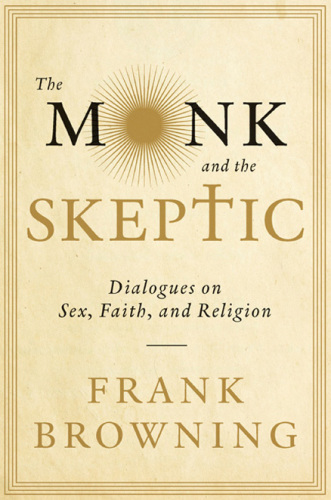
The Monk and the Skeptic
Dialogues on Sex, Faith, and Religion
- اطلاعات
- نقد و بررسی
- دیدگاه کاربران
نقد و بررسی

September 23, 2013
NPR correspondent Browning (A Queer Geography) presents an idiosyncratic examination of reconciling Catholic faith with same-sex desire. Structured loosely around conversations with a sexually active priest, he meanders into brief discussions of ecclesiastical history, the writings of Augustine and Aquinas, and autobiographical experiences. Browning, the self-described skeptic of the title, admits to not being able to understand the priest Peter's ability to balance his erotic life and his clerical life. The work does not offer clear solutions to the tensions of sexuality and religion. Rather, the conversations provide insights into how one man attempts to live a conflicted life. The discussions of Catholic history, doctrine, and practice only skim the surface, though they do provide avenues for further exploration. Perhaps most useful is the model the book offers of individuals coming together for dialogue, despite entrenched differences. Browning never comes to agree with his monk, but he also grants readers an opportunity to build sympathy for Peter's situation.

October 1, 2013
The chance bonding of an outspoken NPR correspondent and a gay priest bridges the gap between faith and sexuality. Through a succession of meetings, Browning (A Queer Geography: Journeys Toward a Sexual Self, 1996, etc.) exposes the intricate dynamics of his interactions with "Brother Peter," a gay priest he befriended in a Paris art gallery. Their conversations advanced and intensified (largely due to Browning's ever-inquisitive nature) as he respectfully challenged the belief system of his newfound confidant. Surprisingly, Peter consistently delivered unfettered comments to a number of provocative issues including masturbation, fornication (he believes penetrative sex to be a "genuine human value" but would never state so publicly), gay pornography and what's behind his intensive involvement and identification with a "broad network of gay motorcycle clubs." Most importantly, however, Browning frankly questions how Peter reconciles his admitted sexual forays (both alone and with other men) with his vow of celibacy. Eschewing relationships and romance, both men admit to reveling in the "disarming intimacy of naked touch," only without expectations. Their conversations conjure a wide swath of references, from gay classicists John Boswell and Daniel Mendelsohn to the charitable faux religious group of nuns The Sisters of Perpetual Indulgence. These chats dovetail with introspective dialogue on men and masculinity, arguments for and against gay marriage, the artfulness of pornography and how Peter's own spiritual revelations brought him to the church. Threatening this weighty and ultimately satisfying exchange of opinion and perspective, however, are circuitous moments in which Peter unconvincingly justifies his life's many contradictions. A flawed but compelling discourse chronicling the "dual dictates of devotion and desire."
COPYRIGHT(2013) Kirkus Reviews, ALL RIGHTS RESERVED.

August 1, 2013
Browning, well known as the author of A Queer Geography and The American Way of Crime, here once again engages questions of same-sex desire in a far-reaching book structured around a series of dialogs with a gay priest, drawing upon ideas from myth, drag performance, contemporary criticism, and Biblical inspirations and injunctions. No easy conclusions are reached, but Browning, through his friendship with the perhaps-fictional "Father Peter," acknowledges the complexities of gay Christian lives. VERDICT A fascinating, rangily structured, and intelligently written book on faith, the self, and sexuality, likely to be of intense interest to gay and lesbian Christians and their supporters.
Copyright 2013 Library Journal, LLC Used with permission.




دیدگاه کاربران